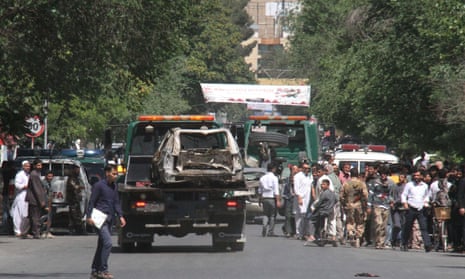For years the Afghan capital was an island of relative security in a country battered by a rising tide of violence. The devastating bombing this Wednesday morning was confirmation that it has now become one of the most dangerous places in Afghanistan, and is another heavy blow to a weak and fractured government.
The rising tempo of attacks in Kabul pose an outsize threat to the government, the fragile economy, to the foreign support that keeps Afghanistan running, to education, media and civil society, that all cluster in the capital.
The attacks are also disproportionately deadly to civilians, because most military and government targets in the city are heavily protected.
“If you are prepared to tolerate the slaughter of innocents [attacks in Kabul] are a very effective way of getting to the people in power,” said Kate Clark, of the Afghanistan Analysts Network. “Afghanistan is a place that needs a bit of stability to get itself together, and crises like this really undermine the government and people’s confidence that the government can protect them.”
Such crises also sow confusion in the western countries which provide funds and troops to prop up the government of the Afghan president, Ashraf Ghani.
Three years after David Cameron declared “mission accomplished” and Barack Obama said the American war in Afghanistan was over, carnage in the heart of Kabul makes it clear that for Afghans there has been no pause in the violence.
There is little appetite in any western country for escalating the war again, even if generals on the ground are calling for more troops, and no recent experience provides evidence that foreign troops can bring real or lasting security.
But few officials with any knowledge of history could advise their leaders to leave the government to its fate either, however weak and corrupt.
Last time foreign powers turned their backs on Afghanistan, after the departure of Russian troops in 1989 prompted US disengagement, the country slid into the violent chaos and warlord feuding that bred the Taliban.
In a world that has since seen the rise of Islamic State (Isis), and where the internet accelerates the dissemination of both ideology and violence, it would seem reckless to experiment with letting Afghanistan disintegrate again.
Even before the latest atrocity, the United Nations had warned that this year was proving deadlier for civilians in Kabul than anywhere else in the country. Casualties in the capital were outpacing the restive eastern and southern provinces – Helmand, Kandahar or Nangahar – that were the cradle of the insurgency and had been the bloody focus of the war in recent years.
“Geographically, Kabul province had the highest number of civilian casualties due to suicide and complex attacks in Kabul city,” the UN mission in Afghanistan said in a report on protection of civilians at the end of April.
It is not yet clear if the rising toll inside the capital is because insurgents are getting better at penetrating the city, because they are targeting civilians where they once aimed at more highly protected targets, or simply because the city’s defenders are failing more often.
Whatever the cause, the deaths are particularly disturbing for a country as impoverished and vulnerable as Afghanistan, which has endured 40 years of violence between factions that have often mutated but rarely laid down arms, and which now seems on the brink of all-out war once again.
For years after the ousting of the Taliban, as the insurgency gathered momentum elsewhere, Kabul seemed to exist in a relative bubble, protected by Afghan and western intelligence services and a serviceable, if much-mocked, police “ring of steel”.
Officials were criticised for putting the safety of their families top of national security priorities, but protecting Kabul was important for the whole country. Civil society expanded, new schools and universities sprang up, and the Afghan capital became easily the most vibrant media hub in a region not known for press freedom. The bomb this Wednesday morning, hidden inside a sewage tanker, hit at all of these aspects.
The first reports focused on embassies, but the terrifyingly vast crater was on a busy intersection and just a few hundred metres from TV studios, a prominent school, smart hotel and string of small shops.
Two government officials, a driver for the BBC, and a technician for the television channel Tolo, have been named among the dead.
“[The] attack was on Kabul’s working people, the telecoms, the banks, private companies, embassies. All working to make Afghanistan a better place,” wrote Wazhma Frogh, a prominent member of parliament.
Today's attack was on Kabul's working people, the telecoms, the banks, private companies, embassies. All working to make Afg a better place
— Madam Frogh (@FroghWazhma) May 31, 2017
No group has yet claimed responsibility for the attack, and the target was so unusual for Afghanistan that some analysts think the explosives, which were hidden inside a tanker used to drain sewage reservoirs, may have detonated prematurely.
There is no location in Kabul where that quantity of explosives could have been detonated without killing and maiming large numbers of civilians. Regardless of maker and motive, the attack represents a heightened threat for the city’s millions of residents.
Isis, which has a growing operation in Afghanistan and little compunction about slaughtering civilians, are obvious suspects. The attack would represent a worrying escalation in their capacities.
The Taliban quickly denied any involvement, but they are a nationalist group trying to build support for eventual government and do not have a reliable track record when it comes to claiming responsibility for violence. In the past they have denied responsibility for attacks – that, like this one have caused widespread public revulsion – even when there was credible evidence linking the group to the events.









